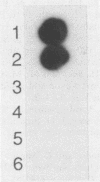Abstract
A polymerase chain reaction (PCR) method was developed for the detection of rodent coronaviruses in biological material by using reverse transcriptase and two primers which flanked an M gene sequence of 375 bp. PCR detected all of 11 different strains of mouse hepatitis virus (MHV) as well as rat sialodacryoadenitis virus but not bovine coronavirus or human coronavirus strains OC43 and 229E. The M gene sequences of bovine coronavirus and human coronavirus OC43 are homologous to that of MHV, but minor differences exist in the primer regions, preventing annealing of the primers. For detecting MHV-Y in tissue samples, PCR was faster than and at least as sensitive as either of the two bioassays (infant mouse bioassay and mouse antibody production test) currently used for MHV diagnostic purposes.
Full text
PDF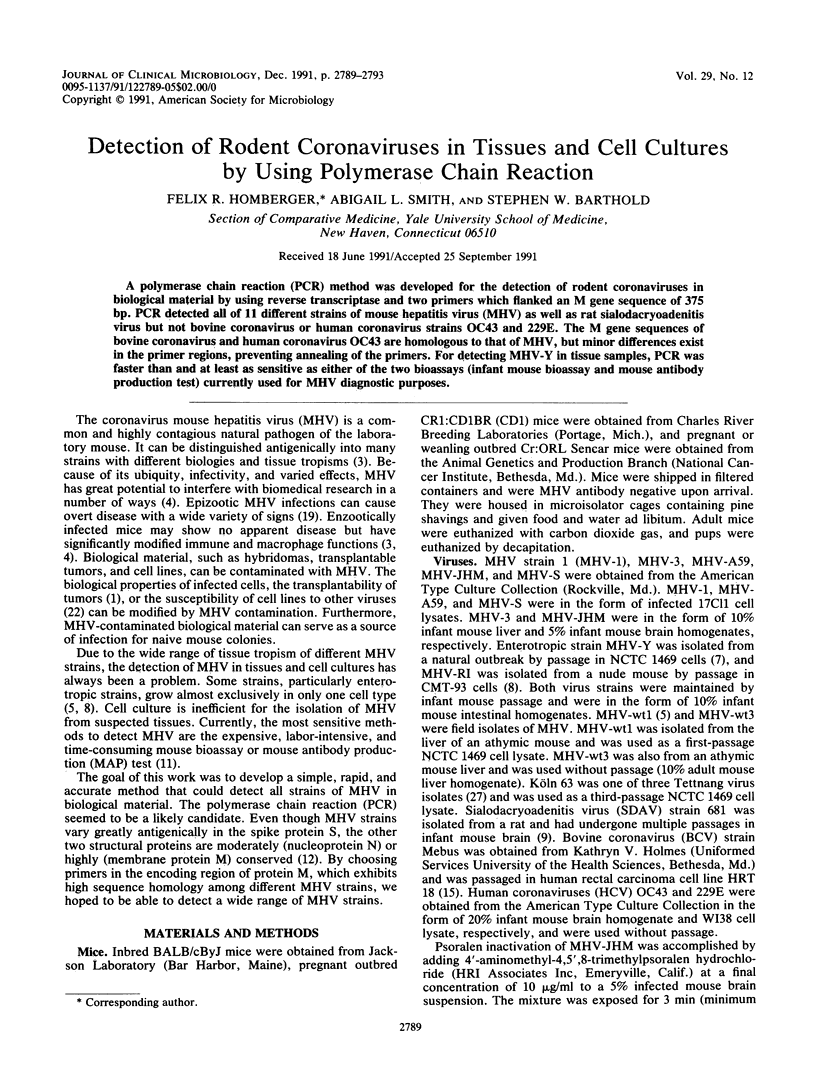
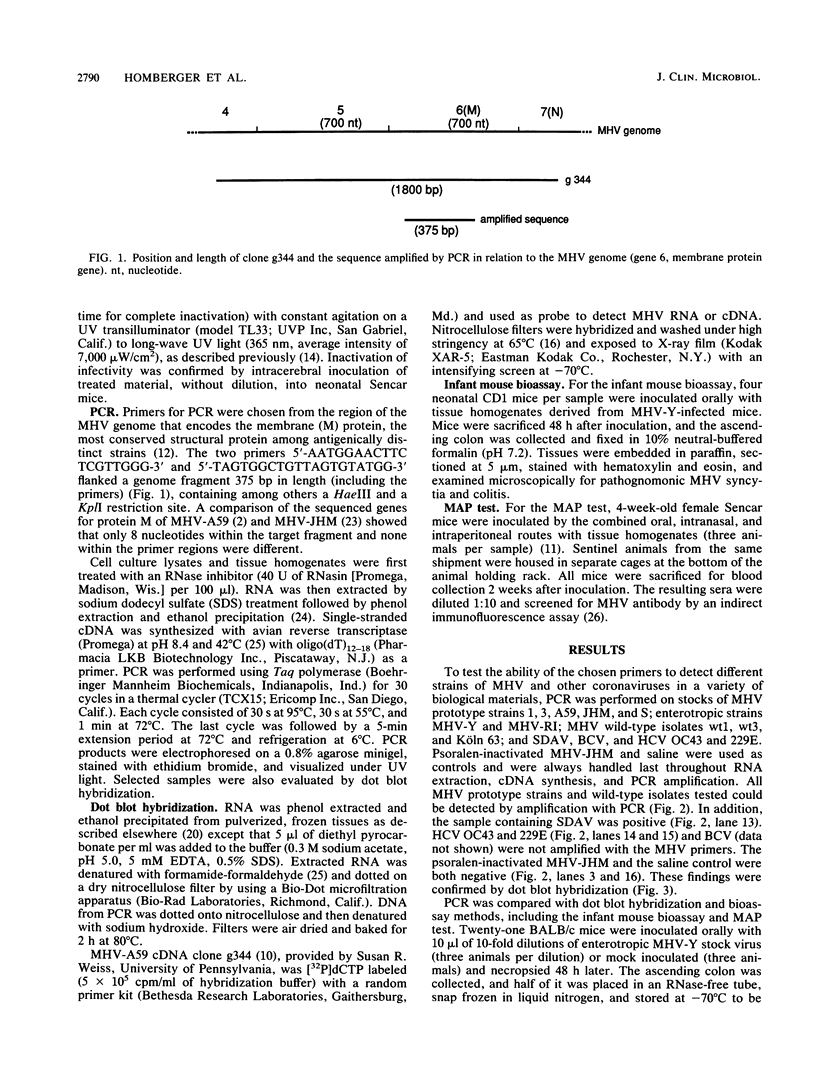
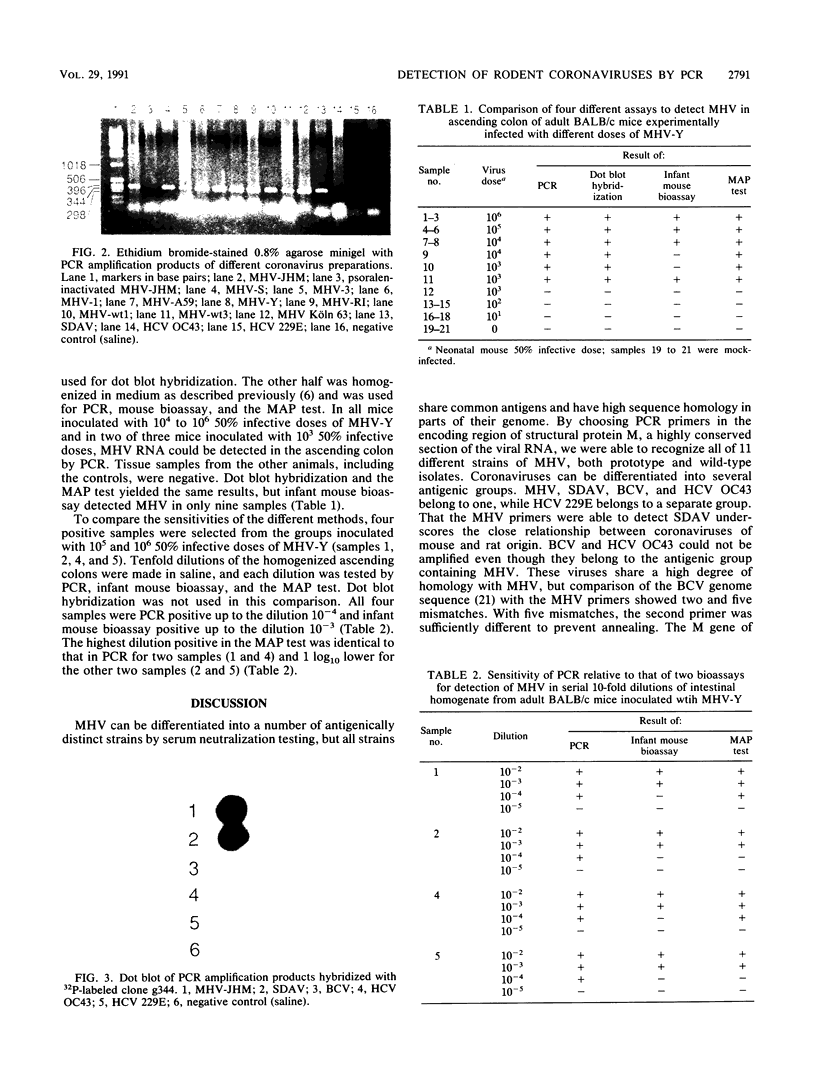
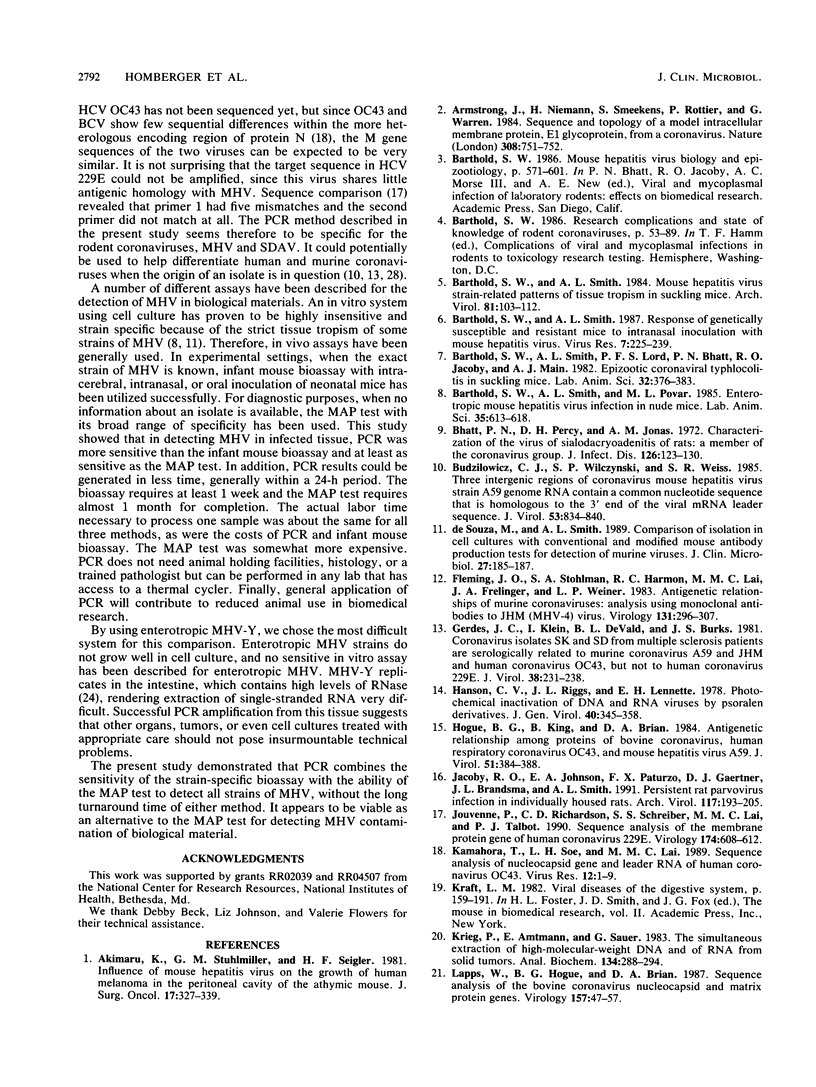
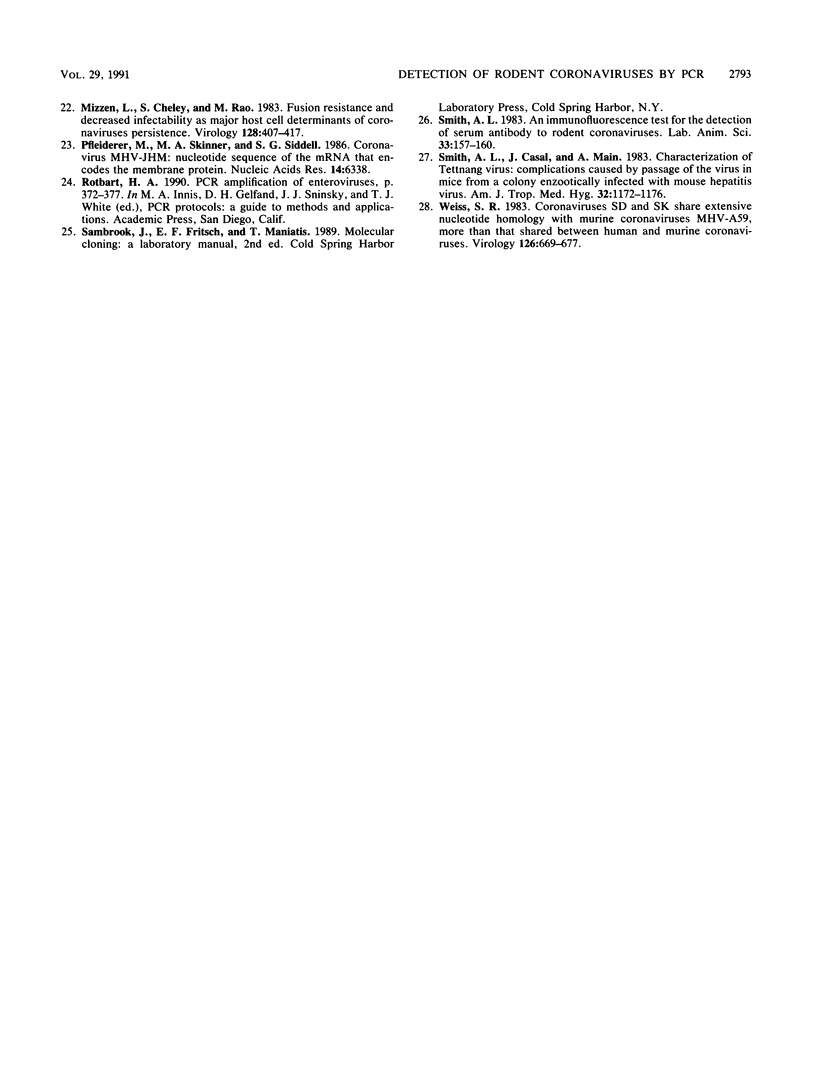
Images in this article
Selected References
These references are in PubMed. This may not be the complete list of references from this article.
- Akimaru K., Stuhlmiller G. M., Seigler H. F. Influence of mouse hepatitis virus on the growth of human melanoma in the peritoneal cavity of the athymic mouse. J Surg Oncol. 1981;17(4):327–339. doi: 10.1002/jso.2930170405. [DOI] [PubMed] [Google Scholar]
- Armstrong J., Niemann H., Smeekens S., Rottier P., Warren G. Sequence and topology of a model intracellular membrane protein, E1 glycoprotein, from a coronavirus. Nature. 1984 Apr 19;308(5961):751–752. doi: 10.1038/308751a0. [DOI] [PMC free article] [PubMed] [Google Scholar]
- Barthold S. W., Smith A. L., Lord P. F., Bhatt P. N., Jacoby R. O., Main A. J. Epizootic coronaviral typhlocolitis in suckling mice. Lab Anim Sci. 1982 Aug;32(4):376–383. [PubMed] [Google Scholar]
- Barthold S. W., Smith A. L. Mouse hepatitis virus strain--related patterns of tissue tropism in suckling mice. Arch Virol. 1984;81(1-2):103–112. doi: 10.1007/BF01309300. [DOI] [PMC free article] [PubMed] [Google Scholar]
- Barthold S. W., Smith A. L., Povar M. L. Enterotropic mouse hepatitis virus infection in nude mice. Lab Anim Sci. 1985 Dec;35(6):613–618. [PubMed] [Google Scholar]
- Barthold S. W., Smith A. L. Response of genetically susceptible and resistant mice to intranasal inoculation with mouse hepatitis virus JHM. Virus Res. 1987 May;7(3):225–239. doi: 10.1016/0168-1702(87)90030-X. [DOI] [PMC free article] [PubMed] [Google Scholar]
- Bhatt P. N., Percy D. H., Jonas A. M. Characterization of the virus of sialodacryoadenitis of rats: a member of the coronavirus group. J Infect Dis. 1972 Aug;126(2):123–130. doi: 10.1093/infdis/126.2.123. [DOI] [PMC free article] [PubMed] [Google Scholar]
- Budzilowicz C. J., Wilczynski S. P., Weiss S. R. Three intergenic regions of coronavirus mouse hepatitis virus strain A59 genome RNA contain a common nucleotide sequence that is homologous to the 3' end of the viral mRNA leader sequence. J Virol. 1985 Mar;53(3):834–840. doi: 10.1128/jvi.53.3.834-840.1985. [DOI] [PMC free article] [PubMed] [Google Scholar]
- Fleming J. O., Stohlman S. A., Harmon R. C., Lai M. M., Frelinger J. A., Weiner L. P. Antigenic relationships of murine coronaviruses: analysis using monoclonal antibodies to JHM (MHV-4) virus. Virology. 1983 Dec;131(2):296–307. doi: 10.1016/0042-6822(83)90498-1. [DOI] [PMC free article] [PubMed] [Google Scholar]
- Gerdes J. C., Klein I., DeVald B. L., Burks J. S. Coronavirus isolates SK and SD from multiple sclerosis patients are serologically related to murine coronaviruses A59 and JHM and human coronavirus OC43, but not to human coronavirus 229E. J Virol. 1981 Apr;38(1):231–238. doi: 10.1128/jvi.38.1.231-238.1981. [DOI] [PMC free article] [PubMed] [Google Scholar]
- Hanson C. V., Riggs J. L., Lennette E. H. Photochemical inactivation of DNA and RNA viruses by psoralen derivatives. J Gen Virol. 1978 Aug;40(2):345–358. doi: 10.1099/0022-1317-40-2-345. [DOI] [PubMed] [Google Scholar]
- Hogue B. G., King B., Brian D. A. Antigenic relationships among proteins of bovine coronavirus, human respiratory coronavirus OC43, and mouse hepatitis coronavirus A59. J Virol. 1984 Aug;51(2):384–388. doi: 10.1128/jvi.51.2.384-388.1984. [DOI] [PMC free article] [PubMed] [Google Scholar]
- Jacoby R. O., Johnson E. A., Paturzo F. X., Gaertner D. J., Brandsma J. L., Smith A. L. Persistent rat parvovirus infection in individually housed rats. Arch Virol. 1991;117(3-4):193–205. doi: 10.1007/BF01310765. [DOI] [PubMed] [Google Scholar]
- Jouvenne P., Richardson C. D., Schreiber S. S., Lai M. M., Talbot P. J. Sequence analysis of the membrane protein gene of human coronavirus 229E. Virology. 1990 Feb;174(2):608–612. doi: 10.1016/0042-6822(90)90115-8. [DOI] [PMC free article] [PubMed] [Google Scholar]
- Kamahora T., Soe L. H., Lai M. M. Sequence analysis of nucleocapsid gene and leader RNA of human coronavirus OC43. Virus Res. 1989 Jan;12(1):1–9. doi: 10.1016/0168-1702(89)90048-8. [DOI] [PMC free article] [PubMed] [Google Scholar]
- Krieg P., Amtmann E., Sauer G. The simultaneous extraction of high-molecular-weight DNA and of RNA from solid tumors. Anal Biochem. 1983 Oct 15;134(2):288–294. doi: 10.1016/0003-2697(83)90299-3. [DOI] [PubMed] [Google Scholar]
- Lapps W., Hogue B. G., Brian D. A. Sequence analysis of the bovine coronavirus nucleocapsid and matrix protein genes. Virology. 1987 Mar;157(1):47–57. doi: 10.1016/0042-6822(87)90312-6. [DOI] [PMC free article] [PubMed] [Google Scholar]
- Mizzen L., Cheley S., Rao M., Wolf R., Anderson R. Fusion resistance and decreased infectability as major host cell determinants of coronavirus persistence. Virology. 1983 Jul 30;128(2):407–417. doi: 10.1016/0042-6822(83)90266-0. [DOI] [PMC free article] [PubMed] [Google Scholar]
- Pfleiderer M., Skinner M. A., Siddell S. G. Coronavirus MHV-JHM: nucleotide sequence of the mRNA that encodes the membrane protein. Nucleic Acids Res. 1986 Aug 11;14(15):6338–6338. doi: 10.1093/nar/14.15.6338. [DOI] [PMC free article] [PubMed] [Google Scholar]
- Smith A. L. An immunofluorescence test for detection of serum antibody to rodent coronaviruses. Lab Anim Sci. 1983 Apr;33(2):157–160. [PubMed] [Google Scholar]
- Smith A. L., Casals J., Main A. J. Antigenic characterization of Tettnang virus: complications caused by passage of the virus in mice from a colony enzootically infected with mouse hepatitis virus. Am J Trop Med Hyg. 1983 Sep;32(5):1172–1176. doi: 10.4269/ajtmh.1983.32.1172. [DOI] [PubMed] [Google Scholar]
- Weiss S. R. Coronaviruses SD and SK share extensive nucleotide homology with murine coronavirus MHV-A59, more than that shared between human and murine coronaviruses. Virology. 1983 Apr 30;126(2):669–677. doi: 10.1016/S0042-6822(83)80022-1. [DOI] [PMC free article] [PubMed] [Google Scholar]
- de Souza M., Smith A. L. Comparison of isolation in cell culture with conventional and modified mouse antibody production tests for detection of murine viruses. J Clin Microbiol. 1989 Jan;27(1):185–187. doi: 10.1128/jcm.27.1.185-187.1989. [DOI] [PMC free article] [PubMed] [Google Scholar]




